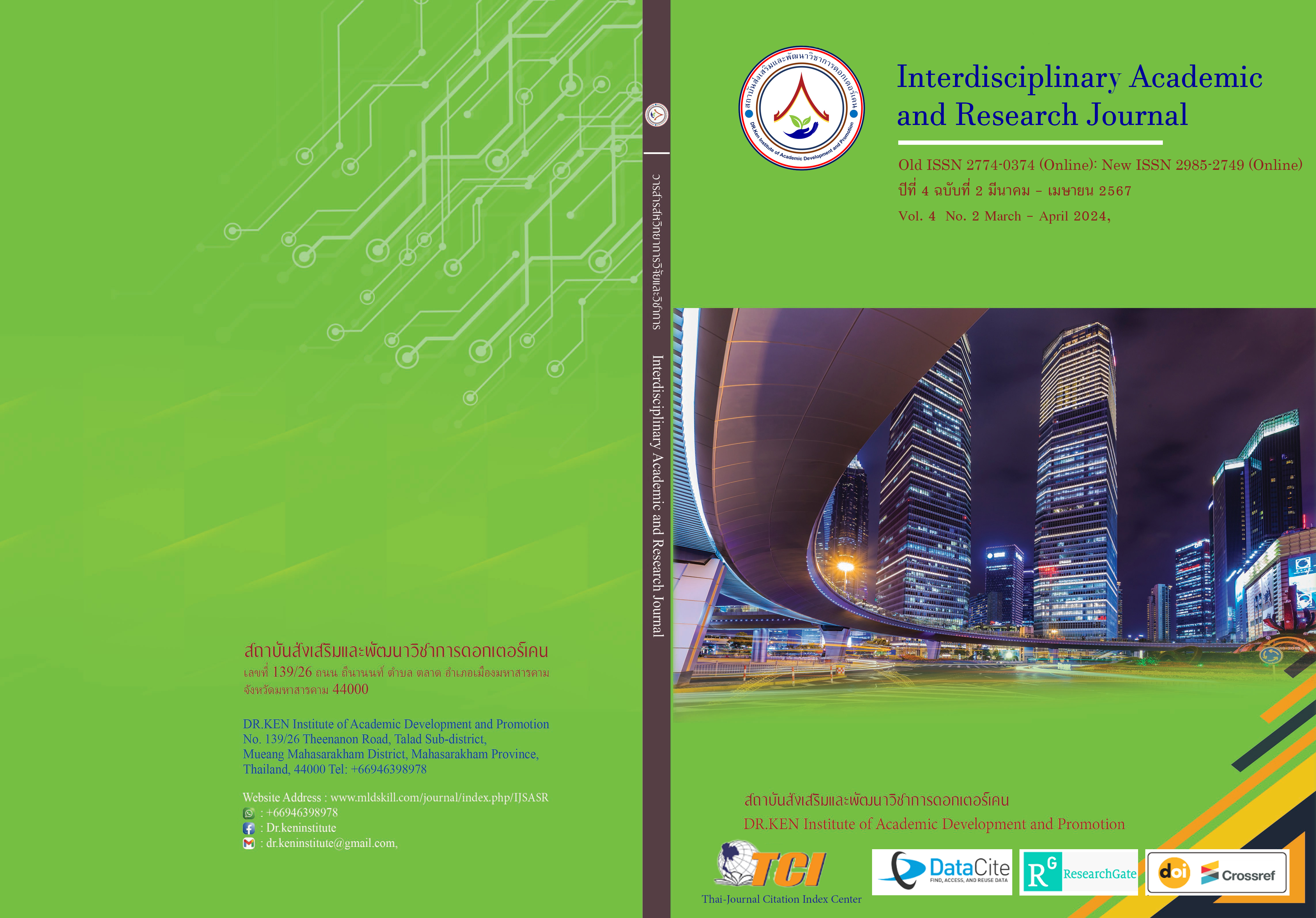Strategic Management and Good Governance Administration Affecting the Supplies Management Efficiency of the Offices of Non-formal and Informal Educational Promotion in Sakon Nakhon Province
DOI:
https://doi.org/10.60027/iarj.2024.275044Keywords:
Strategic Management; , Good Governance Administration; , Supplies ManagementAbstract
Background and Aims: Supplies management is important to management as a factor for success in achieving the organization's vision (Vision) in both small organizations and large organizations. It is essential to have effective supply management. Therefore, workers must have qualifications and have direct knowledge, and the ability to deal with supplies to get the job done successfully and efficiently. Thus, The purposes of the research included the following: 1) To study the level of strategic management, good governance administration, and the supplies management efficiency of the Offices of Non-formal and Informal Educational Promotion in Sakon Nakhon Province, 2) to investigate the influences of strategic management and good governance administration on the supplies management efficiency of the Offices of Non-Formal and Informal Educational Promotion in Sakon Nakhon Province.
Methodology: Obtained through stratified random sampling method, the sample group consisted of 283 personnel who were in charge of managing the supplies in the Offices of the Non-formal and Informal Educational Promotion in Sakon Nakhon Province. The tool used for data collection was a questionnaire and the statistics employed for data analysis were frequency, percentage, mean, standard deviation, and Multiple Regression, Analysis.
Results: (1) The overall strategic management of the Offices of Non-formal and Informal Educational Promotion was at a high level. In a similar vein, the good governance administration of the Offices of Non-formal and Informal Educational Promotion was at a high level). In addition, the supply management efficiency of the Offices of Non-formal and Informal Educational Promotion, as a whole, was also at a high level. (2) These strategic management variables could be used jointly to correctly predict the level of the supplies management efficiency for 89.30 percent (R2Adj=.893) with statistical significance at the .05 level: strategy implementation (β=.403), strategy formulation (β=.274), environmental monitoring (β=.167), and strategy control and evaluation (β=.133). (3) Except for transparency and participation, these good governance administration variables could be used jointly to accurately predict the level of the supplies management efficiency for 89.70 percent (R2Adj=.897), at .05 statistical level of significance: responsibility/accountability (β=.304), morality (β=.241), rule of law (β=.232) and value for money (β=.131).
Conclusion: The results indicate that the strategic management and good governance practices within the Offices of Non-formal and Informal Educational Promotion are highly efficient, significantly impacting the overall supply management effectiveness. Key factors such as strategy implementation, formulation, environmental monitoring, responsibility/accountability, morality, rule of law, and value for money play crucial roles in predicting and improving supply management efficiency, suggesting a strong correlation between strategic management and good governance practices with supply management outcomes.
References
เฉลิมชัย อุทการ. (2563). ปัจจัยของการบริหารงานพัสดุที่มีต่อประสิทธิภาพการบริหารงานพัสดุของนักวิชาการพัสดุในมหาวิทยาลัยมหาวิทยาลัยมหาสารคาม. วารสารการบัญชีและการจัดการ. มหาวิทยาลัยมหาสารคาม. 12(1), 55-65.
ณัษฐนนท ทวีสิน และธรรศพงศ์ วงษ์สวัสดิ์. (2561). ธรรมาภิบาลในกระบวนการจัดซื้อจัดจ้างและพัสดุขององค์การบริหารส่วนตำบลในเขตอำเภอบางระกำ จังหวัดพิษณุโลก. วารสารวิชาการสถาบันวิทยาการจัดการแห่งแปซิฟิค, 4(2), 247-259.
เบญญาภา ยาโตปภา. (2557). การบริหารพัสดุอย่างมีประสิทธิภาพของสำนักงานปลัดกระทรวงทรัพยากรธรรมชาติและสิ่งแวดล้อม. สารนิพนธ์รัฐประศาสนศาสตรมหาบัณฑิต: มหาวิทยาลัยธุรกิจบัณฑิตย์.
ปิยะฉัตร จังหวัดสุข และอุไร สุทธิแย้ม. (2564). ความคิดเห็นของครูที่มีต่อการบริหารจัดการงานพัสดุตามหลักธรรมาภิบาลของผู้บริหารสถานศึกษาในเครือข่ายเพื่อพัฒนาคุณภาพการศึกษา เครือข่ายที่ 2 สำนักงานเขตพื้นที่การศึกษาประถมศึกษาราชบุรี เขต 1. วารสารศิลปากรศึกษาศาสตร์วิจัย, 13(1), 389-401.
รัตนา อาสาทำ. (2562). ปัจจัยที่ส่งผลต่อประสิทธิภาพการบริหารงานพัสดุในมหาวิทยาลัยราชภัฎภาคตะวันออกเฉียงเหนือ. วิทยานิพนธ์บริหารธุรกิจมหาบัณฑิต: มหาวิทยาลัยราชภัฎมหาสารคาม.
วิชาญ อิทธิฤกษ์มงคล. (2564). การบริหารเชิงกลยุทธ์ที่ส่งผลต่อประสิทธิภาพการจัดการสาธารณภัยขององค์กรปกครองส่วนท้องถิ่น ในเขตพื้นที่รอบหนองหาร อำเภอเมืองสกลนคร จังหวัดสกลนคร. วิทยานิพนธ์รัฐประศาสนศาสตรมหาบัณฑิต: มหาวิทยาลัยราชภัฏสกลนคร.
วิลาวรรณ มังคลา. (2564). การจัดการงานพัสดุที่มีประสิทธิภาพของมหาวิทยาลัยเทคโนโลยีราชมงคลสุวรรณภูมิ ศูนย์สุพรรณบุรี. วารสารมหาวิทยาลัยราชมงคลสุวรรณภูมิ, 7(4), 403-413.
วิลาวัลย์ เทียมเลิศ, วีรยา ภัทรอาชาชัย, และ มณิสรา สนั่นเอื้อเม็งไธสง. ผลกระทบของกลยุทธ์การบริหารพัสดุที่มีต่อประสิทธิภาพการดำเนินงานของสถาบันอุดมศึกษาในประเทศไทย. วารสารการบัญชีและการจัดการ. 11 (2), 64-73.
วิษณุกรณ์ โคตรมี. (2565). ปัจจัยที่ส่งผลต่อประสิทธิภาพการบริหารงานพัสดุของเทศบาลตำบลในเขตจังหวัดบึงกาฬ. วิทยานิพนธ์รัฐประศาสนศาสตรมหาบัณฑิต: มหาวิทยาลัยราชภัฏสกลนคร.
ศิรินธร โพธิพล. (2564). ปัจจัยที่ส่งผลต่อประสิทธิภาพการบริหารงานพัสดุของหน่วยงานภายใต้ สังกัดกรมพินิจและคุ้มครองเด็กและเยาวชน. การค้นคว้าอิสระรัฐประศาสนศาสตรมหาบัณฑิต: มหาวิทยาลัยรามคำแหง.
สมชาย สัตยวัน และศิริศักดิ์ หล่าจันขาม. (2563). การจัดการเรื่องร้องเรียนของศูนย์ดำรงธรรม จังหวัดอุดรธานี. วารสารการบริหารปกครอง. 9 (1), 439-464.
สำนักงาน กศน. (2557). คู่มือการปฏิบัติงานการความคุมพัสดุ สำนักงานส่งเสริมการศึกษานอกระบบและการศึกษาตามอัธยาศัย. กรุงเทพฯ: สำนักงานส่งเสริมการศึกษานอกระบบและการศึกษาตามอัธยาศัย.
สำนักงานคณะกรรมการพัฒนาระบบราชการ. (2552). คู่มือการบริหารการเปลี่ยนแปลงเพื่อเสริมสร้างความเป็นเลิศในการปฏิบัติราชการของหน่วยงานภาครัฐ. กรุงเทพฯ: สำนักงานคณะกรรมการพัฒนาระบบราชการ.
สิน พันธุ์พินิจ. (2554). เทคนิคการวิจัยทางสังคมศาสตร์. กรุงเทพฯ: วิทยพัฒน์.
สุพิศ ประณีตพลกรัง (2561). กฎหมายพัสดุ พระราชบัญญัติการจัดซื้อจัดจ้างและการบริหารงานพัสดุภาครัฐ พ.ศ.2560 . กรุงเทพฯ : สำนักพิมพ์บัณฑิตอักษร
สุภาพร ภิรมย์เมือง. (2556). การบริหารเชิงกลยุทธ์ของผู้บริหารกับคุณภาพการศึกษาของโรงเรียน สังกัดสำนักงานเขตพื้นที่การศึกษาประถมศึกษาสุพรรณบุรี เขต 3. วิทยานิพนธ์การศึกษามหาบัณฑิต: มหาวิทยาลัยศิลปากร.
สุภารัตน์ บาลนาคม. (2564). ปัจจัยที่ส่งผลต่อประสิทธิภาพการบริหารงานพัสดุในโรงเรียน สังกัด. สานักงาน เขตพื้นที่การศึกษาประถมศึกษาอุดรธานีเขต 1. วิทยานิพนธ์ครุศาสตรมหาบัณฑิต : มหาวิทยาลัยราชภัฏสกลนคร
สุวารินทร์ จอมคำ และจิรวัฒน์ เมธาสุทธิรัตน์. (2564). ธรรมาภิบาลในกระบวนการจัดซื้อจัดจ้างภาครัฐด้วยระบบอิเล็กทรอนิกส์ขององค์การบริหารส่วนตำบลในจังหวัดเชียงใหม่. วารสารวิทยาเขตนครสวรรค์มหาวิทยาลัยมหาจุฬาลงกรณราชวิทยาลัย, 4(4), 25-37.
เสริมสุข ชลวานิช. (2550). การกำหนดความต้องการและการจัดหาอัตราพัสดุ. นนทบุรี : มหาวิทยาลัยสุโขทัยธรรมาธิราช.
Jones, D., & Towill, D. R. (2017). Lean-agile supply chain management: The next frontier for logistics efficiency. Engineering Management Journal, 29(1), 36-46.
Krejcie, R. V., & Morgan, D. W. (1970). Determining sample size for research activities. Educational and Psychological Measurement, 30(3), 607-610.
Lee, S., & Kozlenkova, I. V. (2020). How e-commerce companies can survive in the face of product returns: A customer experience management perspective. Journal of Retailing, 96(2), 169-183.
Seuring, S., & Müller, M. (2008). From a literature review to a conceptual framework for sustainable supply chain management. Journal of Cleaner Production, 16(15), 1699-1710.
Smith, A., Wang, Y., & Fynes, B. (2020). The impact of RFID technology on efficiency and responsiveness in logistics operations. International Journal of Production Economics, 229, 107788.
Wheelen, T.L. & Hunger, J.D. (2006). Strategic Management and Business Policy. 10th edition. New Jersey: Pearson Prentice Hall.
Downloads
Published
How to Cite
Issue
Section
License
Copyright (c) 2024 Interdisciplinary Academic and Research Journal

This work is licensed under a Creative Commons Attribution-NonCommercial-NoDerivatives 4.0 International License.
Copyright on any article in the Interdisciplinary Academic and Research Journal is retained by the author(s) under the under the Creative Commons Attribution-NonCommercial-NoDerivatives 4.0 International License. Permission to use text, content, images, etc. of publication. Any user to read, download, copy, distribute, print, search, or link to the full texts of articles, crawl them for indexing, pass them as data to software, or use them for any other lawful purpose. But do not use it for commercial use or with the intent to benefit any business.
















.png)


